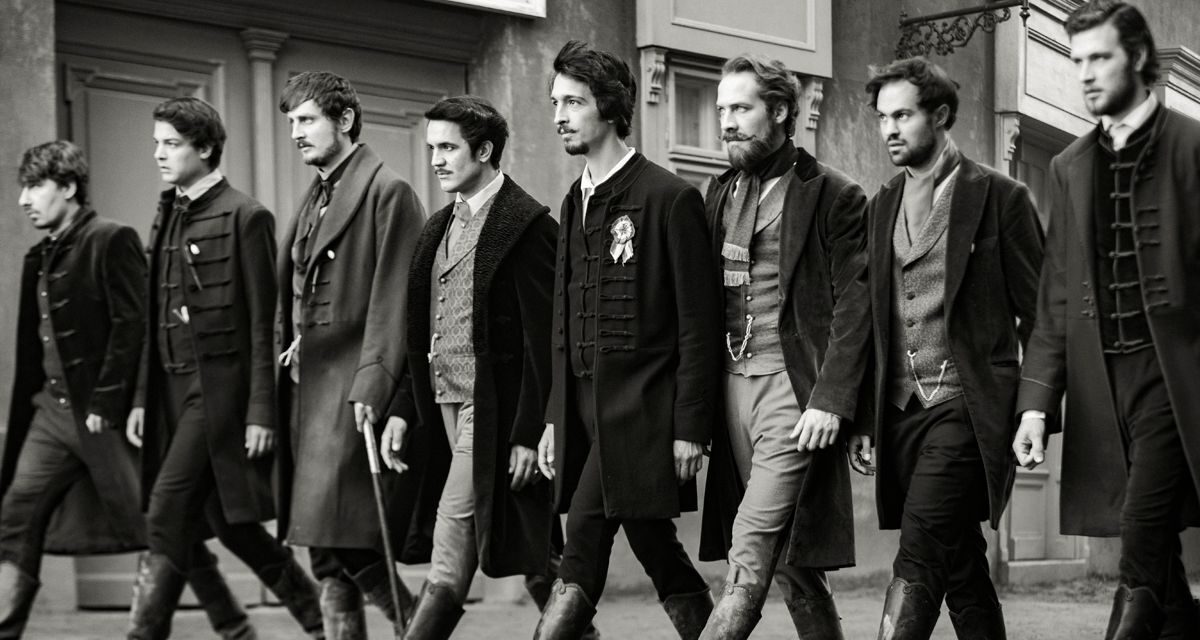If the gem of the opposition press had existed in 1848, standing on the parapet of 24.hu and the National Museum, Petőfi would have recited the National Anthem, Talpra Magyar! at the prompt, the patriotic penmen of the ominous organ would surely have remained seated.
It would be a shame to discuss whether the poet really recited the poem there and then, because it is no longer relevant. On the other hand, there was a revolution, there was a war of independence and there was also poetry, that cannot be disputed. Why did this come to my mind now?
There is this Bence child among the twenty-somethings who wrote. Again. And since he also writes about movies, can you guess what he wrote in Now or never! about the production? Well, of course, they make it up, because the point-blank ones can only drag the admittedly fictional work, albeit based on historical figures and events, into the dust. So that's good for him. Almost.
Can you guess how he feels about the Czech documentary film Waves? Of course, it's cool, apart from a few minor mistakes, it's authentic, great and excellent, because it's "not politicized". However, it is about the events of 1968, when the Warsaw Pact troops invaded the Czechs in the framework of "fraternal aid".
It is claimed by the author.
But this Bence child claims otherwise. For example, (although he does not use these words) that the film also has a political message. The ugly Fico system can take it upon itself, where - he writes - "the Fico regime, which has launched an all-out attack on the media, can rightfully feel at ease".
Oh no! Are we still politicized? And where does the Polish Tusk government remain? In their country, they instigated the cops on public television in a very democratic way, and put opposition politicians in prison. But the Polish comrades are good comrades, for them such films do not convey anything. Or if so, it is appropriate to listen deeply in the editorial office of the hu-hogs.
But let's ignore the author's "small" self-contradictions and see how the boots are put on the table, i.e. in the criticism of the Czech film Now or never! Well, as little Bence tells the truth, i.e. that more people have seen the Czech film than our film, while the latter cost five times as much as the former.
Hey! Who would have thought that a large-scale costume production, which, moreover, requires the clothing and environment of 176 years ago, not yesterday, would be more expensive? To do this, it is not enough to collect last century's knick-knacks and devices from the scrap market, that is, whether you like it or not, such a film costs much more. Especially if you want to be spectacular. Why doesn't KisBence compare the Czech film with the budget of Blokád? Well, that wouldn't be a reason to support or make the comparison suitable for slander, not quite, but almost saying: here, the government spends money on an "explanatory" film, the Czechs do! (But it could also be Romania, it sounds good to them too.)
Tastes and slaps are very different, so I declare according to my own taste - and this is an assessment as serious as that of our friend Bence - Now or never! a particularly watchable, entertaining film. Flawless? Not by any means, but good. It was worth a look. Pathos? Yes, it is. Charm? Unhistorical? Of course, because it is not a documentary film, but a fictional adventure film, in which the viewer finds not the real historical events, but the emotional charge.
Wasn't it? So what? If everything had been filmed as it happened, maybe it would be more watchable? A freak!
The problem with the hus is actually not what is described about it, but what is not. They don't like the fact that it arouses national feelings and inspires in its ahistorical way. And this trouble over there, the national and the inspiring. Their globalist stomachs cannot take this. They flee from him, they fear him like the devil from incense smoke. By the way, this kind of Hungarian approach is frowned upon by the global managers, so you have to attack with thousands, you have to work for the batch.
What nonsense is it to say that a feature film is "politicized"? 1848 was already politicized with a desire for freedom, revolutionary enthusiasm, and a sense of mission to rise up against the oppressors. Is this so hard to understand? Some people do, others don't care about understanding. It is downright silly to claim that it conveys a "current political message". What? How do you love your country? How can you be proud of your predecessors, the actions of your ancestors? If this is current policy, then so be it, I have no objection to it.
But if this is the damned current politics, then you, my friends, must be displeased with patriotism and national pride. And I don't just believe this, I experience it daily from your directions.
And how many people watch which movie in which country is impossible to compare. In our case, it depends on the basic position of the two countries regarding domestic films. Czech films have always remained bourgeois in nature, seasoned with grotesque elements, humor, and hidden criticism of the system. Simply put, they have always been watchable and enjoyable. So the Czechs are not used to going to the cinema.
What about us?
They created their self-expressive works filled with endless boredom with a crowd of artists who proclaimed themselves great directors, but if it was very rare that someone managed to put together a watchable and lovable cinema, it was still only the exception that strengthened the rule. Meanwhile, the dog wasn't interested in the big messes dreamed up by great artists on cellulose either. The so-called artistic monstrosities of the self-proclaimed creators dissuaded the audience from watching Hungarian films.
It is no different now. In addition to the beneficial silence of their names, I would like to point out that even the selected creators of the globalist side are not able to attract as many viewers to the cinema as, for example, Now or Never! they saw a movie. But if viewership is so important, what are those whose "works" are praised by thirty people when they watch them? In their case, is the number of viewers not important?
Let's just say, friend Bence, that I certainly wouldn't watch the movies you like. I know, I'm the petty bourgeois, the dilettante with bad taste, and you're the great judge, but if I have to choose, I'd rather go for movies that I can watch all the way through and I don't mind if they're ahistorical.
I know I'm undemanding, but all I expect from the cinema is for it to be watchable, entertaining, and exciting all the way through the Internet. But it's also okay if it inspires, if it gives something of patriotism, if it revives my national self-awareness. Because I even have that.
How about you?
Author: György Tóth Jr
Cover image: Detail from Now or Never! from the Hungarian film (Source: Facebook)













